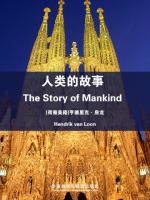The Story of Mankind
A good history book is like a mirror, and The Story of Mankind is one of them. The author Van Loon tells the story from the origin of human beings to every historical period. Unlike ordinary history books, it was as interesting as a novel and I finished it with great interest.
Van Lung started from ancient times, describing the origin of Egypt and Mesopotamia civilization, the splendor of the Greek and Roman times, and the development and evolution of medieval society along the clues of the rise of religion, from the rise of cities, Renaissance, to the revolution of the world and various countries.
Ancient Egypt has always struck me as mysterious. The mummies and the pharaohs and the pyramids, in particular, struck me as incredible, but it's a very small part of their culture. "From the ancient Egyptians, we learned many new things, such as agricultural irrigation methods, temple building techniques, the invention of the calendar," the book says. The beautiful temples they built are regarded as the first examples of the modern church, and the calendars they invented were so accurate that they are still used today with minor modifications. Most importantly, they created writing and made it possible for us to preserve language." I have to admire the wisdom of the ancient Egyptians, whose influence on human history continues to this day.
From the Nile to the Aegean, Van Loon used his magic pen to take me to the continent of Europe. The ancient Greeks gradually learned to make themselves strong skills, but drew a war with the Persians. In a few more centuries Rome went from a small village to a powerful Roman Empire, and another civilization was born. Many wars have led to one legendary story after another.
Another thing that attracted me to the book was that it gradually made me think. For example, when Van Loon introduced Ancient Greece, he first introduced the origin of ancient Greek civilization and then introduced the political system of ancient Greece. He referred to the Greeks' principle of moderation, and then to the question of why only the Greeks, a unique people, possessed this quality, and then to the state of life of the Greeks and their strict education. Following this line of thought and clues, I naturally no longer simply read those vivid historical stories.
In the Middle Ages, human civilization took a big step forward and reached an unsurpassable height. What was left behind was the product of transcending time and space of the ideas of that era, which made me admire from the bottom of my heart. Then, with the idea of freedom, equality and democracy deeply rooted in the hearts of the people, history developed into a new period. But the world changed dramatically after the Industrial Revolution. "This is the age of despicable, shameless retards, and humans have done a lot of stupid things," Van Loon said. Since ancient times, human beings have learned to think, created civilization, but also left a lot of regret. War is like a fierce beast, destroying the beautiful homes of many people; Extremist terrorism is an invisible demon that manipulates the darkest aspects of human nature; Environmental pollution is like diseased cancer cells, encroaching on the health of the earth.
Emperor Taizong of the Tang Dynasty once said: "Take history as a guide to know the ups and downs, copper as a guide to correct the clothes, and people as a guide to know the gains and losses." To know the story of mankind's past is to know oneself as well as a process of exploration. Behind the historical truth, there is a great deal of truth and wisdom. What we need to do is to constantly change and improve ourselves. After all, the story of humanity's future is ours to tell.



 京公网安备 11010802032529号
京公网安备 11010802032529号